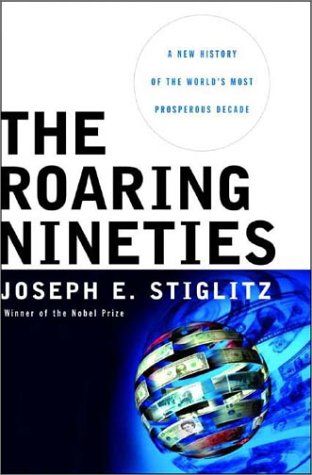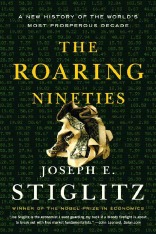0070. THE ROARING NINETIES : 1 ใน 109 หนังสือควรอ่าน จาก นายกฯ ทักษิณ ชินวัตร



เมื่อวันที่ 7 มกราคม 2547 นายกรัฐมนตรีบรรยายพิเศษเรื่อง "มิติใหม่ทางการบริหาร กับ การสร้างความเข้มแข็งทางเศรษฐกิจ" ณ ห้องประชุมสุขุมนัยประดิษฐ์ สถาบันพระปกเกล้า สถาบันพัฒนาข้าราชการพลเรือน ถนนติวานนท์ จังหวัดนนทบุรี มีข้อความตอนหนึ่งว่า...
...."ผมอ่านหนังสือของ Joseph E. Stiglitz เคยเป็นอาจารย์ ได้รับรางวัลโนเบล และ เป็นที่ปรึกษาเศรษฐกิจของ บิล คลินตัน อดีตประธานธิบดีสหรัฐอเมริกาในสมัยแรก และ ภายหลังเป็น SVP (Shared Vision Program) ของธนาคารโลก และ เป็นคนวิจารณ์กองทุนการเงินระหว่างประเทศ (IMF) สิ่งที่โจเชฟพูดคือ ตอนที่เขาได้รับเชิญมาทำงานหให้ประธานธิบดี เขามีความรู้สึกว่าเขาอยากมาทันที เนื่องจากเขาเป็นนักวิชาการ และ นักวิจารณ์อยู่ข้างนอก โดยไม่เห็นอะไรมานาน เขาจะได้มีโอกาสเห็น แล้วเมื่อเขาเห็นแล้ว ทำให้เขาเข้าใจโลกทั้งสองซีกคือ โลกของการที่ไม่เคยมีการปฏิบัติ กับ โลกของการปฏิบัติ และ สิ่งที่เขาพูดอีกอย่างคือ " บทบาทของรัฐกับกลไกตลาด" ต้องมีระบบตรวจสอบ และ สมดุล นั่นคือสิ่งที่เขาอยากทำ
"สิ่งที่ผมอยากจะพูดให้ท่านฟังเกี่ยวกับเรื่องการบริหารการจัดการ ในอดีตระบบราชการไทยเป็นระบบที่หาเจ้าภาพไม่พบ เป็นระบบที่ไม่มียุทธศาสตร์ เป็นระบบที่ไม่มีเป้าหมาย....
อ่าน
นายกรัฐมนตรีบรรยายพิเศษเรื่อง มิติใหม่ทางการบริหารกับการสร้างความเข้มแข็งทางเศรษฐกิจ
ได้ที่
Resource:
//www.thaigov.go.th/webold/news/press/thaksin/pr07jan47-01.htm
ข่าวที่ 01/07-01
วันที่ 7 มกราคม 2546
นายกรัฐมนตรีบรรยายพิเศษเรื่อง มิติใหม่ทางการบริหารกับการสร้างความเข้มแข็งทางเศรษฐกิจ
วันนี้ เวลา 09.30 น. ณ หอประชุมสุขุมนัยประดิษฐ สถาบันพระปกเกล้า สถาบันพัฒนาข้าราชการพลเรือน ถนนติวานนท์ จังหวัดนนทบุรี พ.ต.ท. ทักษิณ ชินวัตร นายกรัฐมนตรี บรรยายพิเศษเรื่อง มิติใหม่ทางการบริหารกับการสร้างความเข้มแข็งทางเศรษฐกิจ ซึ่งสถาบัน พระปกเกล้าจัดขึ้น เพื่อเสริมสร้างความรู้ความเข้าใจเกี่ยวกับการปกครองในระบอบประชาธิปไตย ของไทย กระบวนการเปลี่ยนแปลงที่มีผลกระทบต่อสังคมไทย และเสริมสร้างเจตคติ ค่านิยม และ วิถีชีวิตประชาธิปไตย รวมทั้งเพิ่มพูนทักษะและพฤติกรรมประชาธิปไตยในอันที่จะสร้างบทบาทและ เครือข่ายในการพัฒนาและเผยแพร่ประชาธิปไตย ให้แก่นักศึกษาหลักสูตรการเมืองการปกครอง ในระบอบประชาธิปไตยสำหรับนักบริหารระดับสูง รุ่นที่ 7 นักศึกษาหลักสูตรการบริหารงานภาครัฐและกฎหมายมหาชน รุ่นที่ 3 และนักศึกษาหลักสูตรการบริหารเศรษฐกิจสาธารณะสำหรับนักบริหารระดับสูง รุ่นที่ 2 รวมจำนวน 380 คน
นายกรัฐมนตรีกล่าวแสดงความขอบคุณและกล่าวอวยพรปีใหม่ขอให้ปี 2547 เป็นปีที่ดีสำหรับผู้ที่มีความมุ่งมั่นที่จะพัฒนาตนเองอย่างต่อเนื่องและยึดมั่นในคุณธรรม เพราะอีก 5 ปีข้างหน้าประเทศไทยจะเป็นอันดับหนึ่งในภูมิภาคเอเชียตะวันออกเฉียงใต้ และสิ่งที่สำคัญที่สุดคือสถาบัน ครอบครัว เพราะเป็นสถาบันที่สร้างความเข้มแข็งให้แก่ทุกคนด้วยการลดความเครียดและให้กำลังใจ ในการทำงานให้ได้ดี
นายกรัฐมนตรีบรรยายความสำคัญของการบริหารการจัดการต่อเศรษฐกิจว่า ปัจจัยภายนอกเป็นสิ่งที่กระทบต่อชีวิต แต่การบริหารการจัดการปัจจัยภายในที่ดีสามารถลดความเสี่ยง ดังนั้น เศรษฐกิจของประเทศจึงต้องอาศัยการบริหารการจัดการที่ดี โดยมีเป้าหมายคือสร้างความสมดุล ระบบเศรษฐกิจที่ยั่งยืน พร้อมกับการเข้าใจเหตุการณ์ต่างๆ ที่มีความซับซ้อน ซึ่งต้องอาศัยศาสตร์หลายๆ ศาสตร์ประกอบกัน
การบรรยายพิเศษจะประกอบด้วย 1) มิติใหม่ของโครงสร้างการบริหารการจัดการ 2) การบริหารเศรษฐกิจในอดีต ปัจจุบัน และอนาคต 3) ความยั่งยืน
มิติใหม่ของโครงสร้างการบริหารการจัดการ ตามหลักการ บทบาทของรัฐต้องสมดุลกับกลไกตลาด ดังนั้น จึงจำเป็นต้องปฏิรูประบบราชการ เพื่อสร้างความเป็นเจ้าภาพ กำหนดเป้าหมาย กำหนดยุทธศาสตร์ และประเมินผลตามเป้าหมาย โดยมีขั้นตอนดังนี้ 1) สร้าง Chief Executive Officer:CEO เพื่อสร้างเจ้าภาพในพื้นที่ ในภารกิจตามที่ได้รับมอบหมาย ด้วยการสร้างทีมหรือ หน่วยงานที่เกี่ยวข้อง กำหนดยุทธศาสตร์ และกำหนดเป้าหมายและประเมินผลความสำเร็จ 2) สร้างภาวะความเป็นผู้นำตามความรับผิดชอบในทุกระดับ 3) ปรับเปลี่ยนวัฒนธรรมองค์กรให้เป็นวัฒนธรรมการทำงานร่วมกัน ด้วยการทำความเข้าใจจุดด้อยและเสริมจุดแข็งขององค์กร 4) รู้จักและ เข้าใจสิ่งแวดล้อมองค์กร เพราะแต่ละองค์กรต่างเป็นส่วนหนึ่งของประเทศและมีความเชื่อมโยงกัน นอกจากนี้ CEO จะต้องวิเคราะห์ตัวเลขที่เป็นฐานข้อมูล เพื่อให้การแก้ไขปัญหาเป็นไปอย่างถูกต้อง รวมทั้ง จะต้องมีความรู้ทั้งทฤษฎี การใช้เทคโนโลยีที่จะเป็นธุรกิจที่สามารถขับเคลื่อนเศรษฐกิจ ของประเทศ เพื่ออธิบายให้ผู้เชี่ยวชาญในแต่ละสาขาเข้าใจและสามารถทำงานได้ตามแนวทางของ CEO ซึ่งจะเป็นการลดต้นทุน และเพิ่มศักยภาพของประเทศไทย รวมทั้งเป็นการขยายโอกาสด้วย
การบริหารเศรษฐกิจของประเทศไทย ในอดีตเป็นเศรษฐกิจแบบเน้นการส่งออก ซึ่งไม่มีความสมดุล เพราะทำให้เกิดปัญหาบุกรุกป่าและที่ดินของรัฐเพื่อเป็นที่อยู่อาศัย ดังนั้น รัฐบาลจึงส่งเสริมการสร้างเศรษฐกิจภายในประเทศให้แข็งแรง โดยดึงทุนไปสู่ชนบท ด้วยการสร้างให้ประชาชนมี ที่ดินทำกินเพื่อทำกินในฤดูกาล และสามารถแปลงสินทรัพย์เป็นทุน ทำให้สามารถเข้าถึงแหล่งเงินทุนได้ เพื่อสร้างเศรษฐกิจชุมชนคือ OTOP นอกฤดูกาล ซึ่งจะเป็นการขยายโอกาสให้แก่ชุมชนและเป็นการสร้างคนเก่งให้เป็นผู้ประกอบการรายใหม่ เมื่อเศรษฐกิจชุมชนแข็งแรงจะกลายเป็นวิสาหกิจขนาดกลางและขนาดย่อมที่เข้มแข็ง เนื่องจากเศรษฐกิจในอนาคตมีแนวโน้มการจ้างงานลดลง
ความยั่งยืน รัฐบาลมีนโยบายสำคัญคือ 1) ลดปัญหาความยากจนอย่างจริงจัง ด้วยการจดทะเบียนคนยากจนเพื่อให้สามารถหาแนวทางในการแก้ไขปัญหาอย่างถูกต้อง เพราะคนจนเป็น รากฐานของประเทศ โดยทำให้เกษตรกรมีความภาคภูมิใจในการมีที่ดินทำกินและสามารถแปลง สินทรัพยเป็นทุน 2) ลดปัญหาสังคม สร้างวัฒนธรรมให้แข็งแรง เพื่อสร้างภูมิคุ้มกันให้แก่คนรุ่นใหม่ เฉพาะอย่างยิ่ง ปัญหายาเสพติด
นายกรัฐมนตรีกล่าวย้ำว่า การพัฒนาเศรษฐกิจของประเทศให้มีประสิทธิภาพ จะต้องอาศัยชาตินิยมคือถือผลประโยชน์ของชาติเป็นสำคัญและมีความสามัคคี
--------------------------------------------------
ฝ่ายประชาสัมพันธ์และเผยแพร่ สำนักโฆษก
อภิญญา ตันติรังสี /รายงาน
ดวงฤดี รัตนโอฬาร /ตรวจ
| Create Date : 10 มีนาคม 2551 |
| Last Update : 10 มีนาคม 2551 19:59:36 น. |
|
6 comments
|
| Counter : 1170 Pageviews. |
 |
|
|
The Roaring Nineties: A New History of the World's Most Prosperous Decade
by Joseph E. Stiglitz
W. W. Norton
There is little "new" in Joseph E. Stiglitz's "The Roaring Nineties: A New History of the World's Most Prosperous Decade." Anyone who was not aware that the unprecedented growth under the Clinton administration was as much a result of fiscal policy as luck, or who did not realize that the subsequent corporate scandals and recession could have been prevented during the '90s, has been living in a bubble (or in denial). And anyone who hadn't realized that the Bush tax cut exacerbated the recession and slowed the current recovery probably voted for the "MBA president."
Even Stiglitz's personal accounts of confrontations between the Council of Economic Advisers on which he served from 1993 to 1997 and the voices of Wall Street interest groups in the Department of Treasury should come as little surprise. The story is a familiar one: the economic advisers present their sound analysis of a situation; enter politics. But economists have long groaned about seeing their reasoned policy recommendations sidelined by political wrangling. Even the International Monetary Fund has retorted that the very policies so heavily criticized by Stiglitz in his last book, "Globalization and its Discontents," failed because policy-makers implemented them improperly.
Rather than giving his readers a truly new account of the rise and fall of the roaring '90s, Stiglitz offers two major contributions to the interpretation of the previous decade.
Stiglitz develops a perspective he calls "democratic idealism" a mix of sober economics and social responsibility with an unyielding, optimistic belief in the democratic political process. "I see the market as a powerful instrument for doing good," Stiglitz says, "but one which has not only not lived up to its potential, but has, in the process, left some behind, and actually made some worse off." Critics at the Economist claim that this personal philosophy "provides little operational guidance." There is some truth to the censure since most of Stiglitz's examples are (inevitably) assessed in hindsight. And there is certainly an aspect of mea culpa in Stiglitz's assessment of the Clinton administration that is often couched in a sorrowful tone of if-only.
Still, Stiglitz's prescriptions for moderation and social commitment are refreshing. At a time when protectionism is emerging as a backlash against what Alan Greenspan called the "irrational exuberance" of the '90s, Stiglitz's perspective swings the pendulum back toward the center. In contrast to both those who tout the perfection of the markets and those who have become disillusioned with American capitalism, Stiglitz calls for a balance between government and markets, for transparency to better inform the public and for social justice and empowerment at all levels. His sober perspective urges debunking the myths of the New Economy without disparaging its successes in the '90s in deficit reduction, economic recovery and poverty reduction.
Through "The Roaring Nineties" and "Globalization and its Discontents" Stiglitz has also developed a new nonfiction genre of the economist-laureate cum memoirist. Despite a repetitive and at times overbearing style, Stiglitz's nontechnical texts are an attempt to provide some of the transparency he champions in his books. For an economist whose major academic contributions and those for which he received the Nobel Prize in 2001 focused on the effects of asymmetric information on markets, making the public aware of even just his own perspective on the '90s is a step in the right direction. "If democracies are to work," he argues in his preface, "citizens must understand the basic issues confronting our societies and the way their government works."
In Washington, Stiglitz was often considered an outsider, an academic who based his policy recommendations on empirical evidence rather than partisanship. Moreover, Stiglitz was known for his persistence. In 1999, Jonathan Chait wrote in the American Prospect that "the trouble, as far as the White House was concerned, was not that Stiglitz took the wrong side of the argument, but that he wouldn't shut up." His tenacity was driven by a fundamental belief in giving the public the information to demand sound economic policy.
With "The Roaring Nineties" Stiglitz advances this objective and once again distinguishes himself from many of his colleagues in economic policy who are loath to so candidly confront public scrutiny.
Noam Lupu (noam at flakmag dot com)